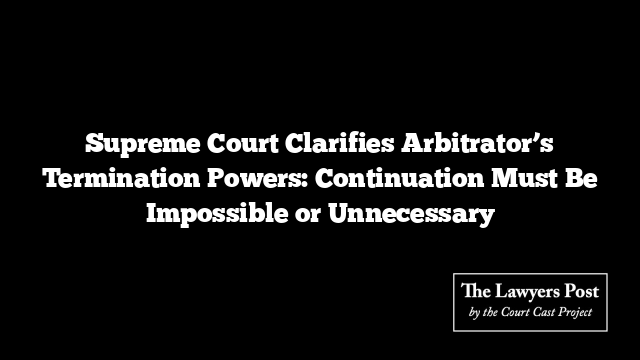The Supreme Court bench of Justices Abhay S. Oka and Pankaj Mithal ruled that an arbitrator’s power under Section 32(2)(c) of the Arbitration and Conciliation Act, 1996 can only be exercised if it becomes impossible or unnecessary to continue the proceedings.
The bench clarified that simply having a reason to terminate the proceedings isn’t enough; the reason must specifically indicate that continuation is either unnecessary or impossible.
Case Background:
This case revolved around the development of a property in Mumbai by Dani Wooltex Corporation, with SheilProperties involved under a Development Agreement. Marico Industries later entered into an agreement to purchase part of this property, which led to disputes and arbitration among Sheil, Marico, and Dani Wooltex Corporation.
Marico’s arbitration concluded with an award in May 2017, while Sheil’s claim languished unresolved. Dani Wooltex Corporation sought dismissal of Sheil’s claim in 2019 and 2020, citing abandonment. Despite various attempts to move forward, Sheil’s arbitration stalled, leading to the Arbitral Tribunal terminating the proceedings in December 2020 under Section 32(2)(c) of the Arbitration Act. Sheil contested this decision in the Bombay High Court, which reversed the termination, prompting Dani Wooltex Corporation to approach the Supreme Court.
Supreme Court Observations:
The Supreme Court scrutinized Section 32 of the Arbitration Act, particularly subsection (2)(c), which allows termination if proceedings become unnecessary or impossible. The court emphasized that non-appearance alone doesn’t suffice to terminate proceedings; abandonment must be clearly established, either explicitly or implicitly, through strong evidence.
The Court highlighted that the mere failure to schedule a hearing doesn’t equate to abandonment. It noted that distinct arbitral proceedings were initiated with Sheil and Marico as claimants in different claims. Sheil actively participated in Marico’s hearings until the award was passed. The Court observed no directive for simultaneous hearings of both claims, implying no procedural failure on Sheil’s part.
The Supreme Court ruled that termination powers should only be used when continuation is genuinely unnecessary or impossible, not due to procedural lapses or non-appearance without valid reasons. The tribunal has a duty to manage and adjudicate disputes effectively, ensuring claims aren’t dismissed without compelling justification.
Conclusion:
The Supreme Court dismissed the appeal, affirming that the power to terminate proceedings under Section 32(2)(c) is to be exercised with caution, ensuring that continuation is impossible or unnecessary based on solid evidence.





